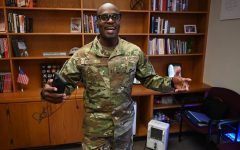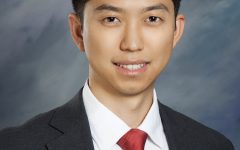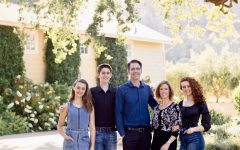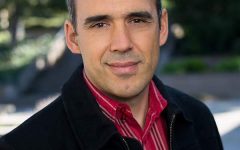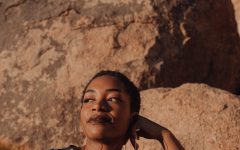Alumni Profile: Dustin Baumbach
February 27, 2017 2017-02-27 9:55Alumni Profile: Dustin Baumbach
PUC alum Dustin Baumbach is a Ph.D. student researching the hawksbill sea turtle. While documenting these endangered animals, Dustin and his research team found the documentation process frustrating. Instead of letting a small setback stop them, they developed an app to solve their problem, called TURT (Turtles Uniting Researchers and Tourists).
We asked Dustin to share about his experiences and how PUC helped give him the tools he needed to become successful.
Tell us about yourself.
My name is Dustin Baumbach, a nature enthusiast, and academic. I enjoy scuba diving, snowboarding, and taking hikes through the forest. During the week, I enjoy working with colleagues to understand the ecology of hawksbill sea turtles and on the weekends, catching up with friends. I also enjoy the pursuit of learning something new and will never pass up the chance to do so, especially when it involves hands on learning. I am a technology geek and thus, enjoy technology based decision making using Geographic Information Systems. However, my interest in technology is not limited to this and also expands to any tool I can use to benefit my research or personal life.
What was your major at PUC?
I originally started off my first year as a biology major with a minor in computer science and then transferred into the environmental science program which was brand new the start of my second year and then realized chemistry would be a better minor to add with it.
What have you been up to since graduating?
After graduation, I immediately started graduate school at the Loma Linda University School of Medicine in the department of Earth and Biological Sciences. During my first year, I spent most of my time learning about hawksbills throughout the world and spent that summer in Honduras collecting data. I now spend my summers in the Caribbean, scuba diving, collecting hawksbill observation, and morphological data.
Where did you get the idea for your app?
We originally started distributing turtle sightings sheets to the dive shops within my field site but quickly noticed they only filled them out while we were in town and not there during the school year. This prompted us to create a web-based map the various dive shops could upload turtle sightings to on a regular basis. However, we realized those dive shops and tourists may not have access to a computer immediately after a dive and therefore would benefit from the creation of a smartphone application.
Describe your typical workday.
A typical workday is highly variable. I am currently working on assessing the caloric value of sea turtle food items at Cal State University San Bernardino two days of the week, working on mass spectrometry the other two days of the week, then I head home to read the current literature about hawksbill foraging behavior. When I am not doing any of these activities, I frequently help teach classes for my advisor, help other students, and write various grants and papers.
What is the most enjoyable part of what you do? The most challenging?
The most enjoyable part of my graduate study is by far my summer research. Doing three dives per day, getting to interact with hawksbills knowing we will aid to help its population recovery by understanding more about this critically endangered species. However, the most challenging part of this is understanding how to work with, and educate, the general public, who may be against the project. This has been a challenge we have been working on for the past four years, but plan to continue in order to promote awareness of sea turtles and the importance in understanding more about their ecology.
How did your time at PUC help prepare you for your career?
The time I spent at PUC was extremely valuable to help prepare me for graduate school. Several of my science classes taught me the self-motivation I needed to persevere in graduate school. Along with this, my biology and environmental science classes taught me the concepts needed to understand how to do research and how to think about an organism’s interaction with its environment. I appreciated how PUC required us to take a wide breadth of classes to increase life skills and general knowledge, helping me to deal with the non-biological portions of conservation biology.
What is the most important thing you learned during your time at PUC?
The most important thing I learned was the reward of self-motivation and hard work. I had to learn this the hard way (not meeting my expectations during my first couple of years), but with a little hard work and motivation, you can achieve anything you set your mind to. I know this sounds cheesy, but starting out with a GPA under 3.0 and then graduating with over a 3.0 is an example of this. A little hard work goes a long way.
Who was your favorite professor while you were at PUC and why?
This is a hard question, I had so many professors I feel were influential in my life but if I had to pick, I would have to choose Dr. Floyd Hayes. As one of the few students in the department of biology interested in attending graduate school in the natural sciences, he taught me how to do research by involving me in hands-on projects and helped me understand the joy of teaching by hiring me as his laboratory teaching assistant. I enjoyed learning in his classes and have always thought he deserves the Educator of the Year award! If students are struggling and come to him for help, he is very willing to work with the you, which is always something I have appreciated. To this day I still write to him asking for advice.
What is your favorite memory from PUC?
I have so many fond memories of PUC. However, my favorite memory from my time at PUC was watching the ‘pumpkin chuck’ during MOGtoberfest (Grainger Hall’s club). Living in the dorm and being a part of the Men of Grainger was such a fun experience. I met a lot of amazing, friendly people and have remained friends with some of them even after graduation. Other fond memories include going on hikes in the back 40, experiencing the beauty of fields of mustard and the blossoming trees, and, as every PUC student knows, eating at the amazing restaurants in the Napa Valley.
What advice would you give to young students?
My advice to students would be to never give up and to rely on your friends for support. Even though life may seem difficult and frustrating, keep your life goals in mind and know, as I stated earlier, with a little hard work and determination, it will all be worth it. Also, never pass up the opportunity to learn something new, you never know when it may become useful.
Dustin has also been featured in several articles by Loma Linda University. Read “Sea turtle app developed by student creates citizen-researchers” and “Loma Linda University researchers expand sea turtle research smartphone apps” to learn more about his process and how this app can help researchers around the world in their study of sea turtles.
TURT (Turtles Uniting Researchers and Tourists) is available on iOs as well as on Android.




